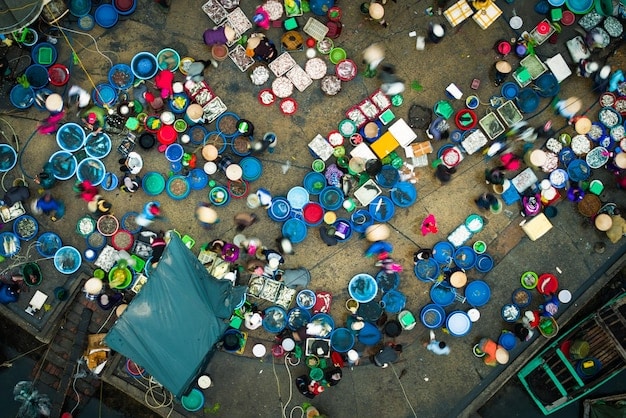2025 Budget: How It Will Reshape US Aid to Africa

The 2025 US budget is poised to significantly impact foreign aid to Africa, potentially altering funding levels and priorities across various sectors, including health, education, and economic development.
The upcoming 2025 US budget is stirring conversations about its potential repercussions on foreign aid to Africa. How Will the 2025 Budget Impact US Foreign Aid to Africa? will depend on a series of decisions that reflect both domestic priorities and foreign policy objectives. Let’s delve into the anticipated changes and their implications for the continent.
Understanding US Foreign Aid to Africa
US foreign aid to Africa is a complex web of programs designed to promote economic growth, improve health outcomes, bolster education, and support democratic governance. Understanding the current landscape of this aid is crucial before projecting the impact of the 2025 budget.
The US has historically been a significant provider of aid to Africa, allocating billions of dollars annually across various sectors. These funds are channeled through governmental organizations like USAID, as well as non-governmental organizations and multilateral institutions.
Key Areas of US Aid
US aid is not distributed evenly across the continent or among sectors. Instead, certain areas receive more attention based on strategic interests, humanitarian needs, and the potential for measurable impact.
- Health: Funding for combating diseases like HIV/AIDS, malaria, and tuberculosis has been a cornerstone of US aid.
- Economic Development: Programs aimed at stimulating economic growth, promoting trade, and supporting small businesses are crucial.
- Education: Investments in education, from primary schools to vocational training, are intended to build human capital.
- Democracy and Governance: Support for democratic institutions, free elections, and the rule of law is another priority.

The effectiveness of US aid has been a subject of ongoing debate. While some programs have demonstrably improved lives and fostered development, others have been criticized for inefficiency, lack of sustainability, or unintended consequences. The 2025 budget provides an opportunity to reassess and potentially redirect aid to maximize its impact.
The 2025 Budget: An Overview
The 2025 budget proposal reflects the current administration’s priorities and economic outlook. Understanding its key elements is essential to anticipating its impact on foreign aid.
Budget proposals often involve trade-offs between domestic spending and foreign assistance. Economic conditions, geopolitical considerations, and political pressures all influence the allocation of resources.
Key Proposals in the 2025 Budget
The proposed budget is expected to outline specific funding levels for various government agencies and programs. Several key proposals could directly or indirectly affect aid to Africa.
- Overall Foreign Aid Allocation: The total amount allocated for foreign aid will set the upper limit for funds available to Africa.
- Priorities within Foreign Aid: The budget may prioritize certain regions or sectors, potentially shifting resources away from Africa or towards specific initiatives.
- Conditional Aid: The budget may stipulate conditions that recipient countries must meet to receive aid, such as progress on human rights or economic reforms.
Understanding the political context surrounding the budget is also vital. Congressional debates, lobbying efforts, and public opinion can all shape the final outcome. Therefore, the initial proposal is just the starting point of a complex process.
Potential Shifts in Funding Priorities
The 2025 budget could bring about significant shifts in funding priorities, impacting the types of programs and initiatives that receive US support in Africa. Understanding these potential shifts is crucial for assessing the budget’s overall impact.
Given the changing global landscape, the budget may reflect a greater emphasis on certain areas, such as security assistance, trade promotion, or climate change mitigation. These shifts could come at the expense of traditional aid programs focused on health or education.
Sectors Likely to Be Affected
Several sectors are particularly vulnerable to changes in funding priorities. A closer look at these areas can provide insights into the budget’s potential impact.
- Health: Funding for HIV/AIDS programs could be maintained, reduced, or re-prioritized toward other health issues.
- Economic Development: Programs aimed at promoting trade and investment may receive increased attention, while direct assistance programs could be cut back.
- Climate Change: Initiatives to support renewable energy, sustainable agriculture, and climate adaptation may see increased funding.

The impact of these shifts will depend on a variety of factors, including the specific details of the budget, the capacity of African governments to adapt, and the availability of alternative sources of funding. Understanding these dynamics is essential for formulating effective strategies to mitigate any negative consequences.
Impact on Key Sectors in Africa
The 2025 budget’s impact will be felt across various key sectors in Africa, each with its own set of challenges and opportunities. Examining these sectors individually can provide a clearer picture of the budget’s overall effects.
Changes in US aid could have ripple effects throughout the African economy and society. Reduced funding for health programs, for example, could lead to increased disease burden and strain on healthcare systems.
Potential Consequences
The implications of the 2025 budget could be far-reaching, affecting everything from economic growth to social stability.
- Health Sector: Reduced funding could slow progress in combating diseases and weaken healthcare infrastructure.
- Education Sector: Cuts to education programs could limit access to schooling and hinder human capital development.
- Agricultural Sector: Changes in agricultural assistance could affect food security and rural livelihoods.
While the potential consequences are significant, there may also be opportunities for African governments to find innovative solutions and build more sustainable development models. The key will be to adapt quickly and leverage domestic resources effectively.
Geopolitical Implications
The 2025 budget’s impact extends beyond economics and development, with potential geopolitical ramifications for US relations with Africa and other global powers.
Changes in US aid levels could affect the perception of the US as a reliable partner and influence its standing in the region. This could create opportunities for other countries to increase their influence.
Regional Dynamics
The budget’s impact will vary across different regions of Africa, depending on their strategic importance and historical ties with the US.
- East Africa: Changes in security assistance could affect the fight against terrorism and regional stability.
- West Africa: Shifts in economic aid could impact trade relations and investment flows.
- Southern Africa: Adjustments to health funding could affect the response to HIV/AIDS and other health challenges.
Ultimately, the 2025 budget will be just one factor shaping US-Africa relations. Other factors, such as trade policies, diplomatic engagement, and cultural exchanges, will also play a role in defining the relationship.
Strategies for African Nations
In the face of potential changes in US foreign aid, African nations can adopt proactive strategies to mitigate risks and enhance their own development efforts. These strategies should focus on building resilience, diversifying funding sources, and strengthening domestic institutions.
Relying solely on foreign aid is not a sustainable development model. African governments can take steps to reduce their dependence on external assistance and mobilize domestic resources.
Key Strategies
Several strategies can help African nations navigate the changing landscape of foreign aid and achieve their development goals.
- Diversify Funding Sources: Explore alternative sources of funding, such as private investment, diaspora remittances, and sovereign wealth funds.
- Strengthen Domestic Revenue Mobilization: Improve tax collection, reduce corruption, and create a more favorable investment climate.
- Enhance Institutional Capacity: Build stronger institutions, improve governance, and promote transparency and accountability.
By adopting these strategies, African nations can become more self-reliant and better positioned to achieve sustainable development, regardless of fluctuations in foreign aid.
| Key Point | Brief Description |
|---|---|
| 💰 Budget Shifts | The 2025 budget may reallocate funds among health, education, and economic development. |
| 🌍 Geopolitical Impact | Changes in US aid could affect its influence in Africa and create opportunities for other nations. |
| 🌱 Sustainable Strategies | African nations should diversify funding and strengthen domestic institutions. |
| 🏥 Health Sector | Reduced funding could slow progress in combating diseases and weaken healthcare infrastructure. |
Frequently Asked Questions (FAQ)
▼
Currently, US foreign aid to Africa focuses on health, economic development, education, and democracy and governance. These sectors receive substantial funding and support from various US agencies and programs.
▼
The 2025 budget could potentially decrease overall funding for healthcare, reallocate resources to different health priorities, or introduce conditional requirements for aid disbursement.
▼
African nations can diversify funding sources, strengthen domestic revenue mobilization, and enhance institutional capacity to lessen reliance on US foreign aid and promote self-sufficiency.
▼
Changes in US aid levels can affect its standing in Africa, potentially opening opportunities for other global powers to increase influence. Aid is a key aspect of diplomatic and strategic relations.
▼
Private investment is a crucial source of capital, fostering economic growth, creating jobs, and promoting innovation. It supplements and, in some cases, substitutes for traditional foreign aid, driving sustainable development.
Conclusion
The 2025 US budget carries significant implications for US foreign aid to Africa, potentially reshaping funding priorities and impacting key sectors across the continent. While the precise consequences remain to be seen, African nations can proactively mitigate risks by diversifying funding sources and strengthening domestic institutions to ensure sustainable development.





